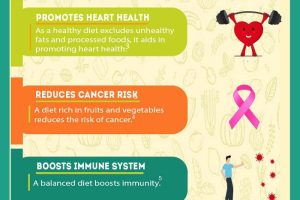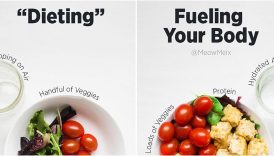Exploring the Benefits of EatingWell for a Balanced Life

Importance of Balanced Nutrition
Balanced nutrition is not just a trend; it’s a fundamental aspect of a healthy lifestyle. By ensuring that the body receives a variety of essential nutrients, individuals can better support their physical and mental health. Imagine starting your day with a wholesome breakfast that includes whole grains, fruits, and proteins—a delicious way to fuel your morning.
- Exploring the Benefits of EatingWell for a Balanced Life
- Importance of Balanced Nutrition
- Connection Between Diet and Wellbeing
- Nutritional Benefits of EatingWell
- Essential Nutrients for Health
- Impact of Balanced Diet on Energy Levels
- Physical Health Benefits
- Weight Management
- Boosted Immune System
- Mental Health Benefits
- Improved Cognitive Function
- Reduction in Stress and Anxiety
- Emotional Wellbeing Benefits
- Stable Mood Regulation
- Increased Overall Happiness
- Support for Overall Wellness
- Better Sleep Quality
- Enhanced Longevity
- Social Benefits of EatingWell
- Strengthening Relationships
- Positive Influence on Community
- Economic Benefits
- Long-term Health Cost Savings
- Improved Work Productivity
- Environmental Impact of Balanced Nutrition
- Sustainable Food Choices
- Reducing Carbon Footprint
- Practical Tips for EatingWell
- Meal Planning Strategies
- How to Make Healthy Choices While Dining Out
- Provides energy for daily activities
- Supports growth and development
- Aids in disease prevention
- Enhances immune function
As seen in many studies, a balanced diet helps maintain optimal body weight and reduces the risk of chronic diseases.
Connection Between Diet and Wellbeing
There’s a profound connection between what we eat and our overall wellbeing. For instance, someone who incorporates plenty of leafy greens and fruits into their meals often reports higher energy levels and improved mood. Key connections include:
- Improved brain function linked to omega-3 fatty acids found in fish
- Lower stress levels associated with a diet rich in antioxidants
- Enhanced emotional health from balanced meals rich in complex carbohydrates
Adopting a balanced nutritional approach can create a positive chain reaction in one’s life—fueling good health and contributing to happiness.
Nutritional Benefits of EatingWell
Essential Nutrients for Health
When we talk about eating well, it’s important to consider essential nutrients that our bodies crave. These nutrients include vitamins, minerals, proteins, fats, and carbohydrates—all of which play a vital role in maintaining health.
- Vitamins & Minerals: Help in immune support and overall cellular function. For example, Vitamin C from citrus fruits boosts immunity.
- Proteins: Are the building blocks of muscles and tissues; think lean meats, beans, and legumes.
- Healthy Fats: Found in avocados and nuts, they nourish the brain and boost heart health.
Remember, a well-rounded diet means your body operates like a well-tuned engine!
Impact of Balanced Diet on Energy Levels
Have you ever noticed how a well-balanced meal can revitalize you? That’s because a diet rich in whole foods can significantly enhance your energy levels. Consider these points:
- Foods high in complex carbohydrates, like whole grains, provide long-lasting energy.
- Proteins stabilize blood sugar levels, preventing those mid-afternoon slumps.
- Hydration is crucial—don’t underestimate the power of water!
With the right nutrition, individuals often experience decreased fatigue and improved overall vitality. Making thoughtful food choices can truly electrify your day!
Physical Health Benefits
Weight Management
One of the most significant physical health benefits of eating well is effective weight management. Maintaining a healthy weight can lead to a host of positive outcomes, including increased energy, improved mood, and a lower risk of chronic diseases. When individuals fuel their bodies with nutrient-dense foods, they tend to feel satiated longer.
- Portion Control: Eating whole foods helps you recognize proper portion sizes without feeling deprived.
- Nutrient-Dense Choices: Foods like fruits, vegetables, and whole grains are lower in calories but high in nutrients, making them ideal for weight maintenance.
- Consistent Eating Habits: Regular meals prevent extreme hunger that can lead to overeating.
It’s not just about losing weight; it’s about cultivating a sustainable lifestyle!
Boosted Immune System
The link between nutrition and immunity is profound. Eating a balanced diet that includes a variety of vitamins and minerals can significantly bolster the immune system. For instance, I remember when I started incorporating more vitamin-rich foods, like bell peppers and berries, into my meals. Not only did I feel healthier, but I also got sick less frequently. Key nutrients for a strong immune system include:
- Vitamin C: Found in citrus fruits, it helps fend off infections.
- Zinc: Found in nuts and seeds, it plays a vital role in immune response.
- Probiotics: Present in yogurt, these good bacteria enhance gut health, which is crucial for immunity.
By focusing on nutrition, individuals can empower their bodies to fend off illnesses and feel their best daily.
Mental Health Benefits
Improved Cognitive Function
In addition to physical health, a well-rounded diet offers remarkable mental health benefits, particularly improved cognitive function. Foods that nourish the brain can enhance memory, focus, and overall mental clarity. For instance, when I switched to a diet rich in antioxidants—like blueberries and dark chocolate—I noticed a significant boost in my ability to concentrate during work tasks. Key cognitive-boosting foods include:
- Fatty Fish: Rich in omega-3 fatty acids, crucial for brain health.
- Leafy Greens: Packed with vitamins that support cognitive wellbeing.
- Whole Grains: Keep blood sugar levels steady, preventing the mid-day crash.
Reduction in Stress and Anxiety
Eating well not only sharpens your mind but also helps to reduce stress and anxiety levels. Diet plays an essential role in mood regulation. When I incorporated more magnesium-rich foods, such as spinach and almonds, into my diet, I started feeling calmer and more centered. To consider:
- Complex Carbohydrates: Help in serotonin production, enhancing mood.
- Vitamin D: Found in fatty fish and fortified foods, can help lessen feelings of anxiety.
- Hydration: Staying well-hydrated is often overlooked but is crucial for mental clarity.
A balanced diet can create a solid foundation for emotional stability and resilience, helping individuals navigate life’s ups and downs more easily.
Emotional Wellbeing Benefits
Stable Mood Regulation
Building on the mental health benefits, emotional wellbeing is another critical area where balanced nutrition shines. Maintaining stable mood regulation can significantly impact one’s quality of life. From personal experience, after I started focusing on nutrient-rich foods, I found my mood swings became less frequent and easier to manage. Foods that contribute to mood stability include:
- Omega-3 Fatty Acids: Found in fish, they can reduce mood fluctuations.
- B Vitamins: Important for brain health and are found in whole grains and meats.
- Magnesium: This mineral, present in leafy greens and nuts, helps calm the nervous system.
By incorporating these foods into daily meals, individuals can foster a more consistent emotional state.
Increased Overall Happiness
Moreover, a balanced diet can play a remarkable role in enhancing overall happiness. Foods rich in nutrients fulfill more than just physical needs; they also impact our emotional states. Just the other day, after making a colorful salad filled with fresh vegetables and a light dressing, I couldn’t help but feel joyful and satisfied with my choices. Consider the following factors:
- Serotonin Production: Whole grains and certain fruits can help boost serotonin levels, a key neurotransmitter tied to happiness.
- Balanced Meals: Regular meals prevent hunger-related irritability and help maintain positive energy.
- Social Connections: Sharing meals with loved ones fosters bonds, promoting feelings of wellbeing.
By consciously choosing nourishing foods, individuals can take significant strides toward enhancing their emotional happiness and overall quality of life.
Support for Overall Wellness
Better Sleep Quality
Continuing from the emotional wellbeing benefits, balanced nutrition also plays a vital part in supporting overall wellness, particularly in enhancing sleep quality. Many may not realize how diet can significantly influence sleep patterns. For example, after I began including sleep-promoting foods like almonds and chamomile tea in my evening routine, I found I could drift off more easily and wake up refreshed. Key foods for better sleep include:
- Complex Carbohydrates: Found in oatmeal or whole grains, they can help you feel drowsy.
- Magnesium-Rich Foods: Spinach, bananas, and pumpkin seeds promote relaxation.
- Lean Proteins: Turkey and fish contain tryptophan, which aids in the production of sleep-regulating hormones.
Enhanced Longevity
Moreover, a nutritious diet is crucial for enhanced longevity. Studies consistently show that individuals who prioritize whole, unprocessed foods tend to live longer, healthier lives. Since adopting a balanced diet, I have felt more energetic and optimistic about the future. Factors influencing longevity include:
- Antioxidants: Foods like berries and green tea combat cellular damage and aging.
- Healthy Fats: Olive oil and avocados support heart health, a key to longevity.
- Regular Nutritional Choices: A consistent focus on whole foods can ward off chronic diseases and promote a longer lifespan.
By emphasizing nutrition, individuals can not only improve their current quality of life but also lay the groundwork for a healthier, longer future.
Social Benefits of EatingWell
Strengthening Relationships
Transitioning from the benefits of overall wellness, it’s important to highlight the social benefits of eating well. Sharing meals has been a long-standing tradition across cultures, and for a good reason. When I started hosting dinner parties focused on healthy eating, not only did we enjoy delicious food, but we also fostered deeper connections. Ways healthy meals strengthen relationships include:
- Creating Shared Experiences: Cooking together can be a fun, bonding activity.
- Encouraging Communication: Meals served around a table naturally lead to conversation.
- Celebrating Health: Supporting each other’s healthy choices can cultivate a positive environment.
Positive Influence on Community
Beyond personal relationships, eating well can have a ripple effect on the community. When individuals prioritize nutritious eating, they create a culture that values health, leading to collective well-being. For instance, when I began supporting local farmers’ markets and advocating for clean eating initiatives in my neighborhood, I noticed more people becoming engaged in healthy lifestyles. Community influences include:
- Support for Local Economies: Purchasing from local farmers strengthens community bonds.
- Inspiring Others: Your commitment to health can motivate friends and family to follow suit.
- Participating in Events: Community gardens and cooking classes can unite diverse groups in a shared mission for better health.
By prioritizing healthy eating, individuals can contribute not only to their well-being but to the social fabric of their communities.
Economic Benefits
Long-term Health Cost Savings
Building on the social benefits of eating well, it’s essential to recognize the economic advantages as well. Investing in nutritious foods can significantly reduce long-term health costs. Personally, I noticed that when I started prioritizing healthy eating, my visits to the doctor became less frequent, which ultimately saved me money on medical bills. Some potential savings include:
- Reduced Healthcare Costs: Healthier diets can lower the risk of chronic diseases like diabetes and heart disease.
- Decreased Medication Needs: With improved health, fewer prescriptions may be necessary.
- Insurance Benefits: Some health insurance providers offer incentives for maintaining a healthy lifestyle, contributing to savings.
Improved Work Productivity
Additionally, a healthy diet boosts work productivity. When individuals eat well, they tend to have more energy, focus better, and make fewer mistakes. I can recall days when I powered through a nutritious breakfast, which led to increased concentration and efficiency at work. Key productivity benefits include:
- Higher Energy Levels: Balanced meals stabilize blood sugar, preventing energy slumps.
- Enhanced Cognitive Function: Nutrient-rich foods improve memory and thinking skills.
- Lower Absenteeism: A healthier workforce results in fewer sick days, which benefits employers.
Embracing a nutritious diet not only enhances personal health but also has profound economic implications, creating a win-win situation for individuals and society alike.
Environmental Impact of Balanced Nutrition
Sustainable Food Choices
As we continue to explore the benefits of nutrition, it’s crucial to highlight its environmental impact. Making balanced, sustainable food choices not only nurtures our bodies but also protects the planet. When I began prioritizing local and seasonal foods, I noticed not only an improvement in my health but also a positive effect on the environment. Key sustainable practices include:
- Supporting Local Farms: Buying produce from local farmers reduces transportation emissions.
- Choosing Plant-Based Options: A diet rich in fruits, vegetables, and grains typically has a lower environmental footprint than one heavy in meat.
- Minimizing Processed Foods: Opting for whole, unprocessed foods can lessen packaging waste.
Reducing Carbon Footprint
Additionally, balanced nutrition plays a role in reducing one’s carbon footprint. For example, when I made the shift from meat-centric meals to more plant-based dishes, I felt not only healthier but also more connected to the environmental cause. Consider these strategies:
- Reducing Food Waste: Planning meals can minimize leftover food that often ends up in landfills.
- Eating Seasonal: Seasonal produce requires fewer resources to grow, which supports a healthier ecosystem.
- Mindful Grocery Shopping: Buying in bulk can help reduce packaging waste.
By consciously choosing sustainable food options, individuals can significantly lower their environmental impact, promoting a healthier planet for generations to come.
Practical Tips for EatingWell
Meal Planning Strategies
With all the benefits of balanced nutrition outlined, let’s dive into practical tips for eating well, starting with meal planning. A structured meal plan can be your best ally in maintaining a healthy diet. When I first tried meal prepping, I was amazed at how much it simplified my week and helped me avoid unhealthy last-minute choices. Effective meal planning strategies include:
- Set Aside Planning Time: Dedicate a specific day to plan meals for the week, ensuring variety and balance.
- Create a Shopping List: Base your list on your meal plan to avoid impulse buys—stick to whole foods as much as possible.
- Batch Cooking: Prepare larger portions of your favorite dishes and freeze them for quick access later.
How to Make Healthy Choices While Dining Out
Dining out doesn’t have to derail your healthy eating goals. With a few smart strategies, you can enjoy meals while making nutritious choices. Whenever I go out, I now find it easier to choose healthier options by sticking to a few guidelines. Tips for dining out include:
- Research Menus Ahead of Time: Many restaurants provide their menus online, allowing you to plan.
- Prioritize Vegetables: Start meals with a salad or vegetable-based dish to fill up on nutrients.
- Watch Portion Sizes: Consider sharing entrees or opting for smaller portions to avoid overeating.
By incorporating these meal planning strategies and learning to dine out wisely, individuals can maintain their commitment to eating well without sacrificing enjoyment in their food choices.





